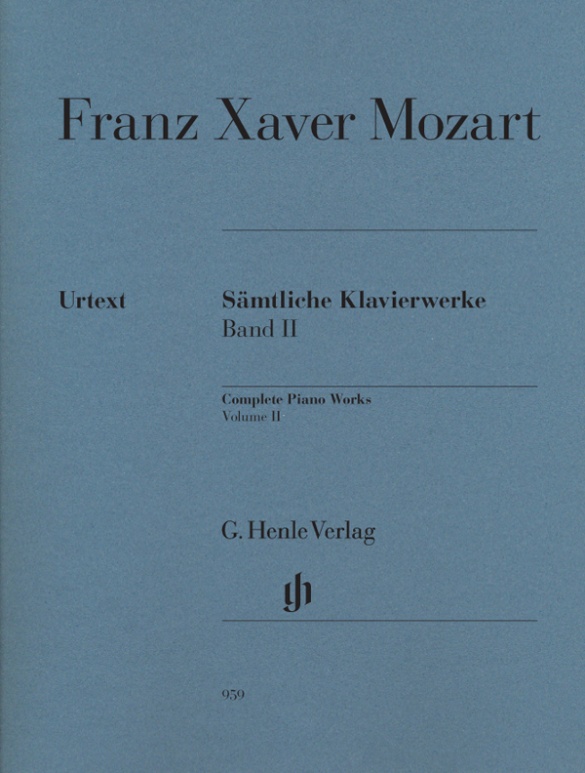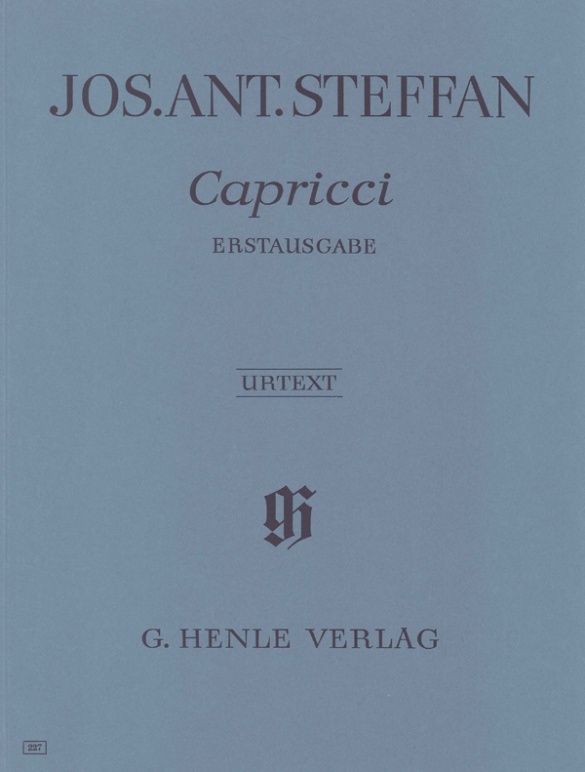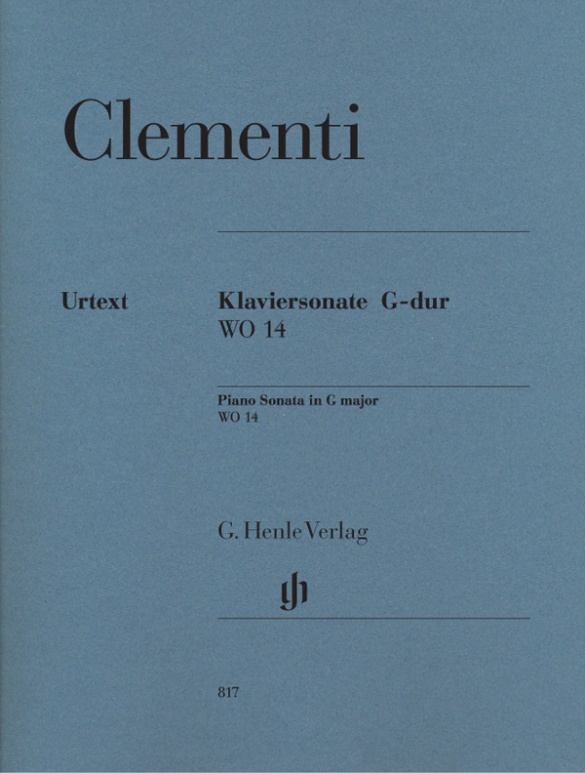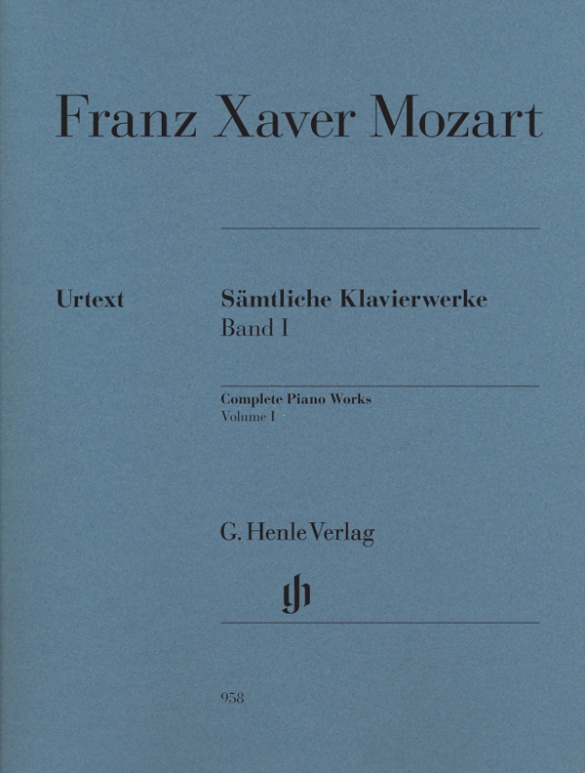

Franz Xaver Mozart
Complete Piano Works, Volume I
Franz Xaver Mozart was W. A. Mozart’s youngest son. Intended for a career in music by his mother from the very beginning, he followed in his father’s footsteps but was not able to step out from under his shadow during his lifetime.
In our edition in two volumes (Volume II, HN 959) we are publishing all of his piano works for two and three hands for the fi rst time. Volume I contains nine, in part very extensive variation cycles (one of them is a first publication), an expansive Fantasia in A major (also a fi rst publication) and the Sonata op. 10 with four movements. A cycle of variations for three hands brings the volume to an original close.
More information
Content/Details
About the Composer
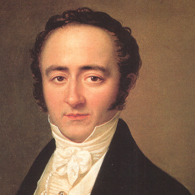
Franz Xaver Mozart
Austrian composer and pianist. In addition to his compositions for piano (including concerti, sonatas, polonaises) he wrote song cycles, chamber music, and other things. His transcriptions of works by his father are important in the reception history of Wolfgang Amadeus Mozart.
| 1791 | Born in Vienna on July 26, the youngest son of Wolfgang Amadeus Mozart. His mother Constanze set him on an early path toward a career in music. In Prague he receives his first piano lessons from Franz Xaver Niemetschek, and in Vienna he is taught by Johann Nepomuk Hummel, Antonio Salieri, and Johann Georg Albrechtsberger, among others. |
| 1802 | His Piano Quartet in G minor, op. 1, is published. |
| 1808–10 | In Pidkamin, Galicia, near Lemberg (Lviv), he is appointed personal music teacher to the children of Count Baworowski. |
| from 1813 | Works as a freelance composer and teacher. |
| 1818 | Genesis and publication of his Piano Concerto in E-flat major, op. 25. |
| 1819–22 | An extended artistic tour takes him through the metropolises of Europe, including Prague, Copenhagen, Warsaw, Berlin, Venice, and Salzburg. |
| 1826 | He founds the St Cecilia Choir of Lviv. |
| 1838 | Back in Vienna he gives concerts and teaches. Ernst Pauer is among his pupils. |
| 1841 | He is named honorary music director of the Salzburg Cathedral Music Society, and of the Mozarteum. His inaugural winter concert that year popularizes Chopin’s works in Vienna. |
| 1842 | He performs in Salzburg as part of ceremonies to consecrate the monument honoring his father. |
| 1844 | Dies in Carlsbad (Karlovy Vary) on July 29. |
About the Authors
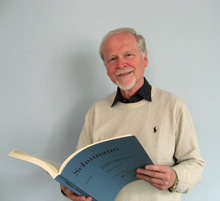
Rolf Koenen (Fingering)
As a pupil, Prof. Rolf Koenen, born in 1946 in Duisburg, had already had contact with Ewald Zimmermann, the first editor at the young publishing house. He studied the piano at the Folkwangschule in Essen with Detlef Kraus, with Ludwig Hoffmann in Munich and with Maria Tipo in Florence.
He gave concerts in a permanent duo partnership with Hansjörg Schellenberger, who was later to become the solo oboe player with the Berlin Philharmonic, and made several recordings with the Deutsche Grammophon-Gesellschaft, with Denon and Sony. Other chamber music partners included András Adorján, Stefan Dohr, Wolfgang Schulz, Claes H. Ahnsjö. Following a teaching position in Munich, Rolf Koenen was appointed as a professor at the Berlin University of the Arts in 1982.
Product Safety Informations (GPSR)

G. Henle Verlag
Here you can find the information about the manufacturer of the product.G. Henle Verlag e.K.
Forstenrieder Allee 122
81476 München
Germany
info@henle.de
www.henle.com
But, be that as it may, this is an historically important publication and provides some good alternative material for older students.
Piano Juornal, 2012De uitgave is prachtig verzorgd, met overzichtelijke informatie per opus.
Pianowereld, 2012Eine echte Entdeckung für den Unterricht.
Piano News, 2012Für gute Klavierspieler lohnen sich die Stücke allemal, denn ihre melodische Gefälligkeit, ihre formale Ordnung, ihr abwechslungsreiches Variationengefüge und eine nie extravagante, doch reizvoll ins Ohr fallende Harmonik werden nicht langweilig.
Acta Mozartiana, 2012The publicity goes on say that as he was not primarily a virtuoso, so these works are also suitable for amateurs. Nonprofessional pianists will certainly enjoy and welcome these compositions to the repertoire, and they deserve to have due recognition. They are ideal for both perfoming and teaching purposes and will appeal to many.
Piano Professional, 2012Questa nuova edizione renderà in parte giustizia al "figlio di Amadeus".
Suonare News, 2013recommendations
autogenerated_cross_selling
Further editions of this title
Further editions of this title


